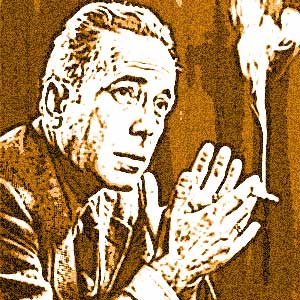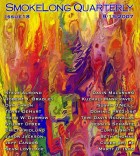The first paragraph contains a strong dreamlike element—the scene and the people involved are vague. “I’ve fucked *it* all up;” “…it’s some kind of official car…” Why did you use this technique to start off with?
Well, at the risk of encouraging a psychological intervention and causing your readers to go looking for some tile to grout, this piece was inspired by a dream. My subconscious mind was sneaking around behind my back. Some writers claim this happens a lot, but I’m not one of them. The dream shocked me. I wrote it down that morning, and considered putting it in my “Delete When a Cooler Head Prevails” folder. I actually came close to swearing off beer for a while, but then I saw that the piece solved a problem I was facing in the novel I¹m writing.
The narrator experiences extreme contradiction between his thoughts and his feelings after the woman jumps. “Good for her,” he thinks, “because it was what she wanted.” But the grief that follows is “a bayonet… a bowie, a claymore, and a Marine officer’s sword running deep… a tomahawk…a heavy, flat war hammer.” Do you think this desire to find the good in a bad situation is inherent in human nature? In this situation, is the good accurate or a lie?
The good here is definitely a lie. At this point in the novel, the father has just tried, and failed, to rescue his daughter from a group of sociopathic boys who are raping, pillaging and plundering to their hearts’ content. (The story takes place in the months following a limited nuclear strike on the U.S. West Coast.)
The father has received a steel-toed boots kind of beating, and this is what runs through his concussed brain. The daughter is determined to maintain her pacifism, no matter the cost – and the cost has been great.
The first sentence drives everything that follows because the father is blaming himself, in advance, for the death of his daughter. The pride he feels here is partially an expression of self-damnation. At the same time, he’s also trying to envision a way in which his daughter will find a way to gain her freedom, where he has failed.
I read this story and thought: wow, that’s terribly beautiful. Is this story beautiful to you? What is your definition of beauty, in a work of literary art?
Thanks. Writers just hate compliments, don’t cha’ know.
As an expression of love/guilt, I hope this piece is effective. But I can’t quite bring myself to say, “Yes, it’s damned beautiful, and guess what? I wrote it, so neener, neener, neener.”
I’m just trying to sneak up on What Is, like anyone, and it’s no secret that literary beauty has to be closely linked to some aspect of human truth. We won’t ever answer The Questions, but in their explorations, some writers can bring about a sense of human solidarity that makes me shiver. I’m talking about the feeling that rises high above empathy for character, and encompasses all of us, here, doing this life thing. If that feeling is served with a side of mood-evoking images, then it’s almost always beautiful to me.
A few American writers who have made me their love slave in this way: Carson McCullers, Kurt Vonnegut, Salinger, Welty, Fitzgerald.
Why did you withhold the identity of the woman until the last line? Similarly, why did you omit the reason for her jumping?
OK, back on the shrink’s couch. Anyway, the dream ended before I knew who the woman was. I knew she was nearly impossibly important to me, but only when I wrote it out did I understand who she was. That’s just the weird way it came out, and it seemed to fit the father’s state of mind.
Since this is coming from a delusional point of view, and obliquely representing a certain point in the action of the novel, the reason for the woman’s jump should be clear in the book. I hope. But let me jot down a note for the revision
Since this is my first issue with SLQ, I thought it’d be appropriate to discuss firsts. Writing firsts. First time you called yourself a writer, first publication, first check. Those sorts of things. So, dish. What is your most memorable writing first?
Well God knows I was clumsy, and I didn’t know how hard to squeeze the goodies, and writing can smell very weird, etc. Anyway, when I finished my B.A. I picked up a loose spiral-bound notebook and sat in a park and had my way with it. Stories came and I knew they weren’t ready for public viewing, but I liked the feeling I got when a hot story dragged me behind a bush and tried to make babies with me. In 1993 I worked up the courage to enter a local short story contest and my story won first place. There was a ceremony. A dignified local writer handed me a check for 500 bucks and people applauded and I felt like the world’s luckiest imposter.



 The core workshop of SmokeLong Fitness is all in writing, so you can take part from anywhere at anytime. We are excited about creating a supportive, consistent and structured environment for flash writers to work on their craft in a community. We are thrilled and proud to say that our workshop participants have won, placed, or been listed in every major flash competition. Community works.
The core workshop of SmokeLong Fitness is all in writing, so you can take part from anywhere at anytime. We are excited about creating a supportive, consistent and structured environment for flash writers to work on their craft in a community. We are thrilled and proud to say that our workshop participants have won, placed, or been listed in every major flash competition. Community works.